West Ham North (UK Parliament constituency)
West Ham North was a borough constituency in the County Borough of West Ham, in what was then Essex but is now Greater London. It returned one Member of Parliament (MP) to the House of Commons of the Parliament of the United Kingdom, elected by the first-past-the-post voting system.
| West Ham North | |
|---|---|
| Former Borough constituency for the House of Commons | |
| 1950–February 1974 | |
| Seats | One |
| Created from | Stratford and Upton |
| Replaced by | Newham North West Newham North East |
| 1885–1918 | |
| Seats | One |
| Type of constituency | Borough constituency |
| Created from | South Essex |
| Replaced by | Stratford and Upton |
History
The constituency was created under the Redistribution of Seats Act 1885 for the 1885 general election, and abolished for the 1918 general election.
It was re-established for the 1950 general election, and abolished again for the February 1974 general election.
Boundaries
1885–1918
The 1885 act created a new parliamentary borough of West Ham which was divided into two single-member divisions. West Ham, North Division consisted of the part of the Local Government District of West Ham north of a boundary formed by a number of railway lines and roads, described as follows:
From a point where the north side of the present London and Tilbury Railway crosses the west boundary of West Ham Parish; thence in a north-easterly direction along the north side of the said railway to a point where the east side of the present North Woolwich Branch of the Great Eastern Railway crosses it; thence in a northerly direction along the east side of the last-mentioned railway to a point opposite the centre of Abbey Road; thence in a north-easterly and easterly direction along the centres of Abbey Road, Church Street North, Portway, and Plashet Lane to the eastern boundary of West Ham Parish.[1]
1950–1974
West Ham North Borough Constituency was created by the Representation of the People Act 1948, and was first contested at the 1950 general election. The seat was defined as consisting of eight wards of the County Borough of West Ham: Broadway, Forest Gate, High Street, Newtown, Park, Plashet Road, Upton and West Ham.[2]
Members of Parliament
MPs 1885–1918
| Election | Member | Party | |
|---|---|---|---|
| 1885 | Edward Rider Cook | Liberal | |
| 1886 | Forrest Fulton | Conservative | |
| 1892 | Archibald Grove | Liberal | |
| 1895 | Ernest Gray | Conservative | |
| 1906 | Charles Masterman | Liberal | |
| 1911 by-election[3] | Maurice de Forest | Liberal | |
| 1918 | constituency abolished: see Stratford and Upton | ||
MPs 1950–1974
| Election | Member | Party | |
|---|---|---|---|
| 1950 | constituency recreated | ||
| 1950 | Arthur Lewis | Labour | |
| Feb 1974 | constituency abolished: see Newham North West and Newham North East | ||
Elections
Elections in the 1880s
| Party | Candidate | Votes | % | ±% | |
|---|---|---|---|---|---|
| Liberal | Edward Rider Cook | 4,219 | 54.7 | ||
| Conservative | Forrest Fulton | 3,500 | 45.3 | ||
| Majority | 719 | 9.4 | |||
| Turnout | 7,719 | 77.0 | |||
| Registered electors | 10,026 | ||||
| Liberal win (new seat) | |||||
| Party | Candidate | Votes | % | ±% | |
|---|---|---|---|---|---|
| Conservative | Forrest Fulton | 3,920 | 55.1 | +9.8 | |
| Liberal | Edward Rider Cook | 3,193 | 44.9 | -9.8 | |
| Majority | 727 | 10.2 | N/A | ||
| Turnout | 7,114 | 70.9 | -6.1 | ||
| Registered electors | 10,026 | ||||
| Conservative gain from Liberal | Swing | +9.8 | |||
Elections in the 1890s

| Party | Candidate | Votes | % | ±% | |
|---|---|---|---|---|---|
| Liberal | Archibald Grove | 4,976 | 50.2 | +5.3 | |
| Conservative | Forrest Fulton | 4,943 | 49.8 | −5.3 | |
| Majority | 33 | 0.4 | N/A | ||
| Turnout | 9,919 | 74.4 | +3.5 | ||
| Registered electors | 13,334 | ||||
| Liberal gain from Conservative | Swing | +5.3 | |||

| Party | Candidate | Votes | % | ±% | |
|---|---|---|---|---|---|
| Conservative | Ernest Gray | 5,635 | 53.3 | +3.5 | |
| Liberal | Archibald Grove | 4,931 | 46.7 | -3.5 | |
| Majority | 704 | 6.6 | N/A | ||
| Turnout | 10,566 | 73.9 | -0.5 | ||
| Registered electors | 14,294 | ||||
| Conservative gain from Liberal | Swing | +3.5 | |||
Elections in the 1900s
| Party | Candidate | Votes | % | ±% | |
|---|---|---|---|---|---|
| Conservative | Ernest Gray | 6,613 | 61.5 | +8.2 | |
| Liberal | John Bethell | 4,133 | 38.5 | −8.2 | |
| Majority | 2,480 | 23.0 | +16.4 | ||
| Turnout | 10,746 | 67.8 | −6.1 | ||
| Registered electors | 15,844 | ||||
| Conservative hold | Swing | +8.2 | |||

| Party | Candidate | Votes | % | ±% | |
|---|---|---|---|---|---|
| Liberal | Charles Masterman | 6,838 | 57.3 | +18.8 | |
| Conservative | Ernest Gray | 5,094 | 42.7 | −18.8 | |
| Majority | 1,744 | 14.6 | N/A | ||
| Turnout | 11,932 | 79.0 | +11.2 | ||
| Registered electors | 15,101 | ||||
| Liberal gain from Conservative | Swing | +18.8 | |||
Elections in the 1910s
| Party | Candidate | Votes | % | ±% | |
|---|---|---|---|---|---|
| Liberal | Charles Masterman | 7,023 | 53.4 | −3.9 | |
| Conservative | Ernest Gray | 6,133 | 46.6 | +3.9 | |
| Majority | 890 | 6.8 | −7.8 | ||
| Turnout | 13,156 | 84.0 | +5.0 | ||
| Registered electors | 15,661 | ||||
| Liberal hold | Swing | −3.9 | |||

| Party | Candidate | Votes | % | ±% | |
|---|---|---|---|---|---|
| Liberal | Charles Masterman | 6,657 | 53.6 | +0.2 | |
| Conservative | Ernest Wild | 5,760 | 46.4 | −0.2 | |
| Majority | 897 | 7.2 | +0.4 | ||
| Turnout | 12,417 | 79.3 | −4.7 | ||
| Registered electors | 15,661 | ||||
| Liberal hold | Swing | +0.2 | |||

| Party | Candidate | Votes | % | ±% | |
|---|---|---|---|---|---|
| Liberal | Maurice de Forest | 6,807 | 54.1 | +0.5 | |
| Conservative | Ernest Wild | 5,776 | 45.9 | -0.5 | |
| Majority | 1,031 | 8.2 | +1.0 | ||
| Turnout | 12,583 | 76.2 | -3.1 | ||
| Liberal hold | Swing | +0.5 | |||
General Election 1914–15:
A General Election was due to take place by the end of 1915. By the autumn of 1914, the following candidates had been adopted to contest that election.
- Liberal: Maurice de Forest
- Unionist: Ernest Wild
Due to the outbreak of war, the election never took place.
Elections in the 1950s
| Party | Candidate | Votes | % | ±% | |
|---|---|---|---|---|---|
| Labour | Arthur Lewis | 33,782 | 68.58 | ||
| Conservative | R. M. Prior | 12,623 | 25.63 | ||
| Liberal | Richard Leslie Phillips | 2,349 | 4.77 | ||
| Christian Democrat | G. W. Dickinson | 503 | 1.02 | ||
| Majority | 21,159 | 42.95 | |||
| Turnout | 49,257 | 77.83 | |||
| Registered electors | 63,288 | ||||
| Labour win (new seat) | |||||
| Party | Candidate | Votes | % | ±% | |
|---|---|---|---|---|---|
| Labour | Arthur Lewis | 34,156 | 70.45 | +1.87 | |
| Conservative | James A. Erskine-Shaw | 14,328 | 29.55 | +3.92 | |
| Majority | 19,828 | 40.90 | -2.06 | ||
| Turnout | 48,484 | 76.57 | -1.26 | ||
| Registered electors | 63,318 | ||||
| Labour hold | Swing | -1.03 | |||
| Party | Candidate | Votes | % | ±% | |
|---|---|---|---|---|---|
| Labour | Arthur Lewis | 27,249 | 65.89 | -4.56 | |
| Conservative | Muriel Bowen | 10,712 | 25.90 | -3.65 | |
| Liberal | David John Howard Penwarden | 3,393 | 8.20 | n/a | |
| Majority | 16,537 | 39.99 | -0.91 | ||
| Turnout | 41,354 | 67.41 | -9.16 | ||
| Registered electors | 61,346 | ||||
| Labour hold | Swing | -4.11 | |||
| Party | Candidate | Votes | % | ±% | |
|---|---|---|---|---|---|
| Labour | Arthur Lewis | 24,096 | 59.2 | -6.66 | |
| Conservative | J. Guy Jones | 9,318 | 22.90 | -3.00 | |
| Liberal | David S. Brooke | 7,271 | 17.9 | +9.67 | |
| Majority | 14,778 | 43.99 | +4.00 | ||
| Turnout | 40,685 | 70.36 | +2.95 | ||
| Registered electors | 57,828 | ||||
| Labour hold | Swing | -1.83 | |||
Elections in the 1960s
| Party | Candidate | Votes | % | ±% | |
|---|---|---|---|---|---|
| Labour | Arthur Lewis | 21,228 | 60.52 | -5.37 | |
| Liberal | Jean Pilkington | 7,005 | 19.97 | +11.77 | |
| Conservative | Christopher Brocklebank-Fowler | 6,844 | 19.51 | -3.39 | |
| Majority | 14,223 | 40.55 | -3.44 | ||
| Turnout | 35,077 | 62.83 | -7.53 | ||
| Registered electors | 55,824 | ||||
| Labour hold | Swing | -8.57 | |||
| Party | Candidate | Votes | % | ±% | |
|---|---|---|---|---|---|
| Labour | Arthur Lewis | 21,778 | 65.62 | +5.10 | |
| Liberal | Jean Pilkington | 5,882 | 17.72 | -2.25 | |
| Conservative | William J Shearman | 5,527 | 16.65 | -2.86 | |
| Majority | 15,896 | 47.90 | +7.35 | ||
| Turnout | 33,187 | 61.83 | -1.00 | ||
| Registered electors | 53,672 | ||||
| Labour hold | Swing | +3.68 | |||
Elections in the 1970s
| Party | Candidate | Votes | % | ±% | |
|---|---|---|---|---|---|
| Labour | Arthur Lewis | 17,664 | 63.17 | -2.45 | |
| Conservative | William J Shearman | 7,130 | 25.50 | +8.85 | |
| Liberal | Brian McCarthy | 3,167 | 11.33 | -6.39 | |
| Majority | 10,534 | 37.67 | -10.23 | ||
| Turnout | 27,961 | 50.32 | -11.51 | ||
| Registered electors | 55,565 | ||||
| Labour hold | Swing | -5.65 | |||
See also
- West Ham South, 1918–1950
References
- Redistribution of Seats Act 1885 C.23, Sixth Schedule, Divisions of Boroughs
- Representation of the People Act 1948 C.65, First Schedule, Parliamentary Constituencies
- Masterman was re-elected in December 1910, but the election was declared void. A by-election was held in July 1911. See London Gazette, issue 28512 (11 July 1911), p. 27.
- Craig, F. W. S., ed. (1974). British Parliamentary Election Results: 1885-1918. London: Macmillan Press. p. 206. ISBN 9781349022984.
- British parliamentary election results, 1885-1918, FWS Craig
- Kimber, Richard. "UK General Election results February 1950". Political Science Resources. Retrieved 12 April 2016.
- Kimber, Richard. "UK General Election results 1951". Political Science Resources. Retrieved 12 April 2016.
- Kimber, Richard. "UK General Election results 1955". Political Science Resources. Retrieved 12 April 2016.
- Kimber, Richard. "UK General Election results 1959". Political Science Resources. Retrieved 12 April 2016.
- Kimber, Richard. "UK General Election results 1964". Political Science Resources. Retrieved 12 April 2016.
- Kimber, Richard. "UK General Election results 1966". Political Science Resources. Retrieved 12 April 2016.
- Kimber, Richard. "UK General Election results 1970". Political Science Resources. Retrieved 12 April 2016.
External links
- Boundary Commissioners for England and Wales (1885). "West Ham. Divisions of New Borough (map)". londonancestor.com.